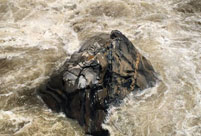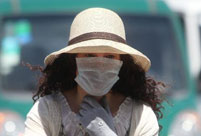 Luoyang aims to become 'Chinese Culture City'
Luoyang aims to become 'Chinese Culture City'
 Century-old jade disc found confirms ancient legend
Century-old jade disc found confirms ancient legend
 A serious mind behind Chinese leader
A serious mind behind Chinese leader
 Panda Cubs to Predict 2014 World Cup Winners
Panda Cubs to Predict 2014 World Cup Winners
 China Southern Airlines flight attendants win titles in service contest
China Southern Airlines flight attendants win titles in service contest
 Pupil's performance art persuades people to stop smoking
Pupil's performance art persuades people to stop smoking
 Nie Chenxi's clay tigers
Nie Chenxi's clay tigers
 Children's Day wishes
Children's Day wishes
 Chinese Kung Fu charms Silicon Valley
Chinese Kung Fu charms Silicon Valley
 Tranquil Yankou ancient town
Tranquil Yankou ancient town
Only three of China's 74 major cities met state pollution standards last year, according to the 2013 China Environmental Situation Report.
Haikou, Zhoushan and Lhasa were the least polluted while Beijing, neighboring Tianjin and cities in north China's Hebei Province were the worst.
Of the 10 cities that suffered the most serious problems, seven were in Hebei, including the worst three — Xingtai, Shijiazhuang and Handan.
Beijing residents breathed "good" air on just 175 days last year.
In Shanghai, environmental authorities said the city had 241 "good" days.
At a press conference ahead of today's World Environment Day, Li Ganjie, vice minister of environmental protection, quoted the report as saying that although China's environment had improved in general, water quality is "not optimistic" and air quality in cities is "serious."
In China's top 10 river valleys in 2013, about 9 percent of the water sections was class V, the worst level. Of 4,778 monitoring sites for groundwater almost 60 percent were poor or extremely poor.
Water quality offshore was not good either, according to the report, with 18.6 percent of offshore water areas only reaching class IV. Water quality in the East China Sea and in four of China's nine biggest bays was extremely poor.
As for air quality in cities, accumulation of air pollutants such as sulfur dioxide and nitric oxide led to acid rain which mostly affected areas along the Yangtze River, especially the southern side of the middle and lower reaches, around 10.6 percent of the nation's land.
Soil pollution and land degradation are also serious, according to Li, who said arable land had been reduced by 80,200 hectares in 2013, and a total of 295 million hectares, or 30.7 percent of China's land area, was suffering soil erosion.
China's soil was found to be mainly polluted by industrial and agricultural activities. About 82.8 percent of the polluted land was contaminated by inorganic materials with the top three pollutants cadmium, nickel and arsenic.
The wide use of antibiotics in the animal husbandry industry also raised pollution risks.
Zhou Shengxian, minister for environmental protection, told Xinhua news agency that emissions of major pollutants had dropped in the past year.
For example, chemical oxygen demand emissions reduced by 2.9 percent, while emissions of sulfur dioxide dropped by 3.5 percent, but compared to 2012, the percentage of class V water quality in the 10 major river basins dropped by only 1.2 percentage points.
As for air quality in cities, a five-year action plan in 2013 put forward 35 integrated measures. The plan stipulated cuts in coal use and the density of inhalable particulate matter, as well as the closure of polluting enterprises.
In April, a revised law on environmental protection was approved, stipulating environmental protection as a basic policy, and prioritizing protection over development.
Zhou said he wants to improve the legal system to establish more strict supervision of environment issues, and address pollution of water, air and soil.
Li said the ministry sees water, air and soil pollution as major tasks, adding that action plans will address water and soil pollution as soon as possible.
Better handling of the interplay between economic development and environmental protection was also needed.
 Magnificent Hutiao Gorge
Magnificent Hutiao Gorge  Heat waves hit China
Heat waves hit China Love at the construction site
Love at the construction site Graduation photos bring memories back to life
Graduation photos bring memories back to life Art school students present works in Nanjing
Art school students present works in Nanjing Xinjiang's first high-speed railway goes on trial run
Xinjiang's first high-speed railway goes on trial run 3D Sea-life Themed Art Garage unveiled in Zhengzhou
3D Sea-life Themed Art Garage unveiled in Zhengzhou
 Creative Photos go viral during graduation season
Creative Photos go viral during graduation season Students in last-minute effort for Gaokao
Students in last-minute effort for Gaokao Dali, an ideal summer vacation destination
Dali, an ideal summer vacation destination Xichan Temple's little monk hit the Internet
Xichan Temple's little monk hit the Internet Monologue of a modern dancer
Monologue of a modern dancer College girl proposes to boyfriend on Weibo
College girl proposes to boyfriend on Weibo Special operation members in counter-terrorism training
Special operation members in counter-terrorism training American football brings manhood out of boys
American football brings manhood out of boysDay|Week|Month